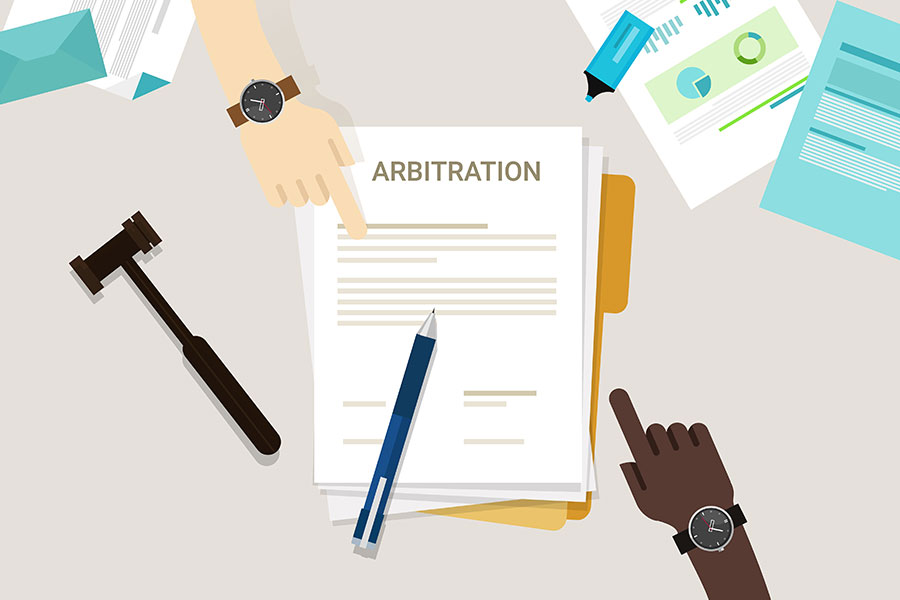Doctrine of Arbitral Immunity: Is it Carte Blanche?

Abstract: The authors of this article describe the importance of the independence and impartiality
clause in the context of arbitration and how it came to be significant in the Indian context. They
also clarified the rationale behind adopting the language on arbitrator immunity, which gives
arbitrators protection from legal action. The law does not give prima facie support for the doctrine
of arbitral immunity, but the exceptions provided are more focused on the arbitrator’s actions or
omissions that have the potential to be detrimental to the arbitral process, despite the fact that the
elements of good faith remain a grey area and nothing is absolute. Therefore, arbitrators need not
use caution when making rulings, but there must be an element of caution that comes along with
the same.
Citation: S. Jain & V. Joshi, “Doctrine of Arbitral Immunity: Is It Carte Blanche?”, (Vol 2, 2022), pp.
14.
INTRODUCTION
Independence and impartiality are perhaps considered to be the heart and soul of the arbitration
proceedings that depicts the hallmarks of a good arbitrator and essence of a seamless proceeding.
Instances where serious allegations are casted on the independence of the arbitrator, the same have
the effect to derail the entire arbitration itself. In similar vein, there must not be instances wherein
the arbitrator is put under the fear of being held liable for damages or any legal actions against him
as a consequence of the decisions that he makes in good faith and as being duty bound to
adjudicate the disputes before him.
Some interesting observations in this regard were made by Lord Denning in his opinion in Sirros
v. Moore2 wherein he observed:
Just like judges, ‘[an arbitrator] should be able to work in complete independence and free from fear. He
should not have to turn the pages of his books with trembling fingers, asking himself: ‘If I do this, shall I
be liable in damages?’…He is not to be plagued with allegations of malice or ill-will or bias or anything
of the kind.’
Essentially, arbitrators like judges, should be able to work without fear. To prevent trembling
fingers of an arbitrator, the doctrine of arbitral immunity has now become the preferred ‘way-out’
or the ‘safest defence’ whereby arbitrators can claim safeguards from a legal action against them.
Significantly, whilst the constituents of good faith remain a grey area, it may be safely construed
to encompass all acts/decisions taken by the arbitrator in furtherance of his/her mandate and
during the course of the arbitral proceedings, while following the substantive procedure of law
and exercising his discretion judiciously.
The Indian law has only recently adopted the doctrine of arbitral immunity inasmuch as the
concept stands codified under Section 42B of the Arbitration and Conciliation Act, 1996 (“the
Act”).3 Section 42B of the Act which was inserted vide the Arbitration and Conciliation
(Amendment) Act, 20194 (“2019 Amendment Act”), and it provides that the arbitrator will not
be liable for any decisions taken by him during the course of the arbitral proceedings and ones
that are taken in good faith. From the first blush, it appears that the draftsmen intended to provide
a blanket ban on the parties from pursuing any legal recourse directly or in-directly against the
arbitrator. However, a deeper analysis would reveal that the Act itself provides for certain
exceptions that can be read along with the doctrine of arbitral immunity. The following sections
of this article will steer across the various provisions and their respective stipulations that can be
read as exceptions to the doctrine of arbitral immunity.
CONCEPT OF ARBITRAL IMMUNITY
The first instance of judicial immunity developed in common law jurisdictions dates back to the
year 1607 when Lord Coke had opined that King’s Bench were immune from being sued in courts
for the acts performed in their judicial capacity.5 In this light, the foundations of judicial immunity
have been extended to arbitral immunity given the statutory appointment and judicial functions
performed by arbitrators in discharge of their duties.
Any aggrieved party is at liberty to take appropriate recourse in law and agitate all grievances
therein. In this regard, there exist ample legislative avenues to do so. However, bringing an
arbitrator before a court of law for any decision that was taken in good faith by them would
tantamount to exceeding the scope of judicial discipline itself. Thus, there lies no reason or scope
for arbitrators to defend suits brought against them by disgruntled parties. To safeguard the
arbitrators from such frivolous and vile attempts of the parties, the doctrine of arbitral immunity
holds immense relevance in today’s day and age. Time and again the courts in India have
deprecated the practice of making the arbitrator a party to the challenge proceedings. In Kothari
Industrial Corporation Ltd. v. M/s. Southern Petrochemicals Industries Corporation Limited & Anr.6, the
Hon’ble Madras High Court had observed as follows:
“It is a pernicious practice in this court to implead arbitrators or arbitral tribunals when there is no need to do so. Often, arbitrators are embarrassed upon receipt of notice. It is only in a rare case when a personal allegation is made against an arbitrator may such arbitrator be impleaded. Just as in case of a revision or an appeal the lower forum or the Judge manning the lower forum is not impleaded as a party, in proceedings under Section 34 of the Arbitration and Conciliation Act, 1996, the arbitrator or the members of the arbitral tribunal are utterly unnecessary parties unless specific personal allegations are levelled against them that would require such persons to answer the allegations.”
Apart from safeguarding the arbitrators from any legal actions taken against them by the parties,
it must be seen from the perspective and touchstone of sanctity of decisions passed by them as
well. To this extent, arbitral immunity may also be regarded as stronger than the judicial immunity.
This is solely premised on the fact that decision passed by an arbitrator in the form of an arbitral
award is subjected to judicial review on extremely narrow and limited grounds. Given the pro-
enforcement stance being adopted by a plethora of jurisdictions, there is an inherent trend that
courts lean in favour of enforcement of arbitral awards rather than setting aside the same. On the
other hand, judicial decisions passed by courts are routinely appealed before higher courts as a
matter of right or by craving leave by depicting requisite grounds. Thus, arbitral immunity is only
strengthened by this very fact that the sanctity of decisions are preserved, directly enforced and
less susceptible to being set aside. At the same time, this creates an obligation of independence
and impartiality much stronger on the arbitrator.
There lies much more to the concept of arbitral immunity but has been generally overlooked. In
cases where the arbitrator has been appointed by mutual consent of the disputing parties, there
lies no room for either party to question the arbitrator about any decision that has been taken in
good faith and bring a legal action against him for the same. If the concept of party autonomy is
desired to be knit in the very fabric of arbitration, it also remains paramount that the arbitrator is
given the freedom to make any decision regarding the dispute and within the terms of reference
without hesitating or about the ramifications of the decision. This freedom of decision making
must not be taken away from the arbitrator at all, until and unless the arbitrator himself decides
that he does not have jurisdiction to rule in a specific dispute7 or is rendered de jure or de facto unable
to perform his functions, as provided under the Act.8
Notably, arbitral immunity now stands codified under the Act by virtue of Section 42B that
safeguards the arbitrator from any action that was done in good faith. This was recently brought
in the arbitration sphere in India vide the 2019 Amendment Act.9 Pertinently, protection of the
arbitrators was already encapsulated under various rules of the arbitral institutions10, however the
same now stands codified by virtue of the 2019 Amendment Act and in the law of the land, which
would apply to every Indian seated arbitration.
However, the Indian law provides far more than what meets the eye. It is perhaps a misconception
that the arbitrator possesses blanket immunity from all actions done in good faith.
EXCEPTIONS
The underlying objective of exploring the possible exceptions is aimed at bringing forward certain
cases wherein the arbitrators could be held liable for certain acts and may also attract consequences.
However, it is apposite to note that there exist no direct exceptions to the doctrine of arbitral immunity but
these exceptions are more towards actions/omissions of the arbitrator that have the degree of being
detrimental to the arbitral process.
1. De jure or de facto inability of the Arbitrator
Section 14 of the Act prescribes the conditions wherein the mandate of the arbitrator is liable to
terminated and the erstwhile arbitrator would be substituted. One of the foremost pre-conditions
is the de jure (in accordance with law) or de facto (by the very fact) inability of the arbitrator to
perform his statutory functions.11 The de jure or de facto inability of the arbitrator to discharge his
functions also points to usurping the arbitral immunity since the objective of Section 14 of the Act
is aimed at removal of the existing arbitrator and effectuate a substitution of the arbitrator.
Interestingly, Section 14 of the Act does not operate in silo from other provisions of the Act.
Section 14 is closely and intricately linked with Section 12(5) of the Act that provides for the
inability of the arbitrator in case he falls under any of the categories specified under the seventh
schedule of the Act that would render him ineligible.12 Therefore, lack of proper disclosure from
the arbitrator’s end could attract the consequences under Section 12(5) of the Act, save and except
in cases where the parties consciously waive the applicability by an express agreement in writing
as prescribed under the proviso to Section 12(5) of the Act.
Thus, any overt act which might be constituted as bias, would be a basis for arbitrator’s removal
that is squarely addressed under Section 12(5) of the Act. Pertinently, once the consequences of
Section 12(5) are attracted, Section 14(1)(a) becomes the applicable provision that renders the
arbitrator de jure unable to perform his functions.
2. Failure to pass the award within the timelines stipulated in the Act
The second exception includes the imposition of monetary penalty on the arbitrator. In accordance
with the proviso to Section 29A(4), if the court finds that the proceedings have been delayed for
reasons attributable to the arbitral tribunal, then a reduction of the fee may be ordered that does
not exceed 5% for each month of the delay.13
The proviso is perhaps one of the most stringent penalties that the arbitrator could be penalized
with under the Act, considering the fact that arbitral immunity will not be applicable in such cases.
Even though a reasonable opportunity is contemplated by the Act, the imposition of monetary
deductions is noteworthy from the perspective of usurping the arbitral immunity.
The failure of an arbitrator in not passing the award within a reasonable timeline has been
considered to be a serious fallacy in the arbitration regime in India. In-fact, the Hon’ble Delhi
High Court in Director General, Central Reserve Police Force v. Fibroplast Marine Pvt. Ltd.14 has
recognized the inordinate and unexplained delay in passing of the award to be against the Public Policy of
India and susceptible to set-aside the award. This reflects the pro-arbitration stance in India and
also treating the failure of the arbitrator to comply with the timelines as a serious issue.
3. Failure to act in accordance with the mandate and causin g inordinate delay
Another notable provision attracting the usurping of the arbitral immunity is codified under
Section 14 of the Act wherein the mandate of the arbitrator can be terminated if he fails to act
without undue delay.15 Pertinently, termination of the mandate of the arbitrator is akin to stripping
him with all authority, immediately thereafter the protection under Section 42B of the Act is no
more available. If the competent court determines that the arbitrator caused inordinate delay, the
mandate will be terminated as postulated under Section 14 of the Act.
Recently, in Swadesh Kumar Agarwal v. Dinesh Kumar Agarwal16, it was asserted that the Ld. Sole
Arbitrator had caused undue delay in conducting the arbitral proceedings that prompted one of
the parties to allege termination of his mandate. Whilst the Hon’ble Supreme Court refrained from
returning any findings on the merits of the allegations, the same was remitted back to the
concerned court to be determined in accordance with the law. This is another instance which
shows that the courts in India are not prone to brushing aside such allegations without any
consideration.
4. Fraud and Corruption
The captioned grounds have, perhaps, been one of the most debatable grounds under the Act for
resisting an award by the award-debtor either under Section 34 or even under Section 36 of the
Act, after the Arbitration and Conciliation (Amendment) Act, 2021 (“2021 Amendment Act”).
Interestingly, proving fraud at the stage of Section 34 of the Act is challenging for the award-
debtor given the fact that courts would look to preserve the sanctity of the arbitral award and only
permit very narrow grounds for making an interference. Albeit, this position has now been
substantially altered due to the insertion of new provisions that provide an unconditional stay on
the award where the award-debtor is prima facie able to depict fraud or corruption.17 Therefore, the
2021 Amendment Act has certainly given rise to certain concerning aspects.
Coming to the concerning part, the same arises in a twofold manner i.e., (i) an unconditional stay
on the award that runs contrary to the well settled position of law and (ii) questioning the
arbitrator’s decision on serious grounds that could have manifold ramifications.
Whilst addressing the former, the judgment in Hindustan Construction Company v. Union of India18
holds relevance since it disregarded the practice of automatic stay on arbitral awards. Moreover,
the threshold for deciding the constituents of prima facie case would again be subjected to judicial
scrutiny in the near future.
The latter would involve raising serious questions on the integrity and independent decision
making of the arbitrator since the courts under Section 34 would have to dig deeper into discerning
the element of fraud or corruption through reviewing the merits (that is strictly prohibited).
Therefore, a roving inquiry by the courts under Section 34 to determine the element of fraud
would usurp the arbitral immunity and, in many ways, eventually reopen the entire docket of the
case. Further, to take recourse of this provision, it is imperative for the party alleging fraud and
corruption, to demonstrate it with the help of cogent and/or direct or circumstantial evidence.
Thus, grounds such as fraud and corruption carry a heavy baggage that has the ability to take away
the layer of immunity conferred on the arbitrator, thus seriously looked down upon.
5. Protection from only acts/omissions done in discharge of duties
Significantly, even from a bare perusal of Section 42B of the Act, it can be inferred that only
actions/omissions done in discharge of the duties are exempted from any consequences. Thus,
any personal act that may have civil/penal consequences are not exempted. Therefore, the concept
of arbitral immunity to be understood as blanket immunity is perhaps incorrect and comes with
its own caveats as addressed hereinabove.
CONCLUSION
Granting blanket immunity to the arbitrator(s) is certainly not the right approach given the
influential factors that come along with it. However, in many ways, the doctrine of arbitral
immunity remains more inclined towards the perceptions rather than technicalities. In other words,
it is only a school of thought that arbitral immunity is carte blanche. There are several factors that
could usurp the same. Therefore, it is not that arbitrators must beware whilst making decisions
but there must be an element of caution that comes along with the same. Moreover, it must be
appreciated that parties do not benefit from extending immunity to arbitrators. If a court forms
an opinion to terminate the mandate of the arbitrator due to failure or non-performance, the fault
lies at the end of the arbitrator and parties are made to litigate before several judicial forums
creating a ‘no-win’ situation.





